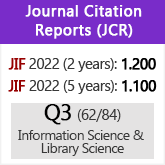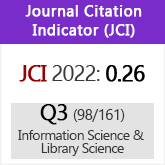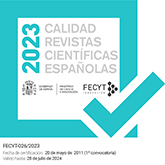Decentralization of scientific activity. The major role of central regions: the case of Madrid
DOI:
https://doi.org/10.3989/redc.2009.3.684Keywords:
Web of Science, regional collaboration, Madrid, network analysisAbstract
In recent years there has been an increasing trend towards the decentralization of Spanish scientific production, with Madrid gradually losing its dominant role. To examine this process, the present study raises a series of questions, such as which regions are most increasing their scientific output?, and what is the importance of cooperation with Madrid in this growth? Whether collaboration with Madrid contributes towards improving the impact and visibility of publications is also examined. To answer these questions, Spanish scientific production was analysed using the Web of Science international databases (period 2001-2005).The results show that the Valencia and Andalusia regions are those which have most increased their scientific production, but proportionally the most exceptional growth was achieved in Castilla-La Mancha. Although collaboration with Madrid is very significant, Catalonia is also an important region in this respect. However, cooperation with Madrid especially improved the impact and visibility of publications in the area of clinical medicine, and this region continues to be an important centre of scientific development, the support of which is vital to the growth of output in the smallest regions of Spain.
Downloads
References
Batagelj, V., y Mrvar, A. (2002): Pajek - Program for Large Network Analysis. http://vlado.fmf.uni-lj.si/pub/networks/pajek/ [30-09-2008].
Beaver, D. De B. (2001): Refl ections on scientific collaboration (and its study): past, present and future. Scientometrics, vol. 52 (3), 365-377. doi:10.1023/A:1014254214337
Borgatti, S. P.; Everett, M. G., y Freeman, L. C. (2002): Ucinet 6 for Windows. Software for Social Network Analysis. Harvard: Analytic Technologies.
De Filippo, D.; Morillo, F., y Fernández, M. T. (2008): Indicadores de colaboración científica del CSIC con Latinoamérica en bases de datos internacionales. Revista Española de Documentación Científica, vol. 31 (1), 66-84.
Dos Santos, N. F., y Rumjanek, V. M. (2001) Brazilian immunology: One hundred years later. Scientometrics, vol. 50 (3), 405-418. doi:10.1023/A:1010502513971
Glänzel, W. (2001): National characteristics in international scientific co-authorship relations. Scientometrics, vol. 51 (1), 69-115. doi:10.1023/A:1010512628145
Godin, B., e Ippersiel, M. P. (1996): Scientific collaboration at the regional level: The case of a small country. Scientometrics, vol. 36 (1), 59-68. doi:10.1007/BF02126645
Gómez, I; Bordons, M; Morillo, F; De Filippo, D., y Aparicio, J. (2009): Science & Technology Indicators for EULARINET. IEDCYT, Madrid.
Gómez, I.; Bordons, M.; Morillo, F., y Fernández, M. T. (2005): Regionalisation of science and technology data in Spain. Research Evaluation, vol. 14 (2), 137-148. doi:10.3152/147154405781776193
Gómez, I.; Fernández, M. T.; Bordons, M.; Morillo, F.; Aparicio, J.; Candelario, A.; De Filippo, D.; González-Albo, B.; Herrero, M., y Moreno, L. (2007): Indicadores de Producción Científica y Tecnológica de la Comunidad de Madrid (PIPCYT). Dirección General de Universidades e Investigación. Consejería de Educación. Comunidad de Madrid. Madrid, p. 232.
Kim, K. W. (2006): Measuring international research collaboration of peripheral countries: taking the context into consideration. Scientometrics, vol. 66 (2), 231-240 doi:10.1007/s11192-006-0017-0
Larivière, V.; Gingras, Y., y Archambault, E. (2006): Canadian collaboration networks: A comparative analysis of the natural sciences, social sciences and the humanities. Scientometrics, vol. 68 (3), 519-533. doi:10.1007/s11192-006-0127-8
Leydesdorff, L., y Wagner, C. (2006): Is the United States losing ground in science? A global perspective on the world science system. http://users.fmg.uva.nl/lleydesdorff/US_Science/US_Science.pdf [15-10-2008].
Markusova, V. A; Minin, V. A.; Libkind, A. N.; Jansz, C. N. M.; Zitt, M., y Bassecoulard-Zitt, E. (2004): Research in non-metropolitan universities as a new stage of science development in Russia. Scientometrics, vol. 60 (3), 365-383. doi:10.1023/B:SCIE.0000034380.12874.cc
Meneghini, R. (1996): The key role of collaborative work in the growth of Brazilian science in the last ten years. Scientometrics, vol. 35 (3), 367-373. doi:10.1007/BF02016907
Moed, H. F. (2000): Bibliometric indicators reflect publication and management strategies. Scientometrics, vol. 47 (2), 323-346. doi:10.1023/A:1005695111622
Okubo, Y., y Zitt, M. (2004): Searching for research integration across Europe: a closer look at international and inter-regional collaboration in France. Science and Public Policy, vol. 31 (3), 213-226. doi:10.3152/147154304781780019
Otte, E., y Rousseau, R. (2002): Social network analysis: a powerful strategy, also for the information sciences. Journal of Information Science, vol. 28 (6), 441-453. doi:10.1177/016555150202800601
Russell, J. M.; Ainsworth, S.; Del Río, J. A.; Narváez-Berthelemot, N., y Cortés, H. D. (2007): Colaboración científica entre países de la región latinoamericana. Revista Española de Documentación Científica, vol. 30 (2), 180-198.
Schubert, A.; Glänzel, W. (2006): Cross-national preference in co-authorship, referentes and citations. Scientometrics, vol. 69 (2), 409-428. doi:10.1007/s11192-006-0160-7
Van Raan, A. F. J. (1998): The influence of international collaboration on the impact of research results. Scientometrics, vol. 42 (3), 423-428. doi:10.1007/BF02458380
Wagner, C. (2005): Six case studies of international collaboration in science. Scientometrics, vol. 62 (1), 3-26. doi:10.1007/s11192-005-0001-0
Downloads
Published
How to Cite
Issue
Section
License
Copyright (c) 2009 Consejo Superior de Investigaciones Científicas (CSIC)

This work is licensed under a Creative Commons Attribution 4.0 International License.
© CSIC. Manuscripts published in both the printed and online versions of this Journal are the property of Consejo Superior de Investigaciones Científicas, and quoting this source is a requirement for any partial or full reproduction.All contents of this electronic edition, except where otherwise noted, are distributed under a “Creative Commons Attribution 4.0 International” (CC BY 4.0) License. You may read here the basic information and the legal text of the license. The indication of the CC BY 4.0 License must be expressly stated in this way when necessary.
Self-archiving in repositories, personal webpages or similar, of any version other than the published by the Editor, is not allowed.

















